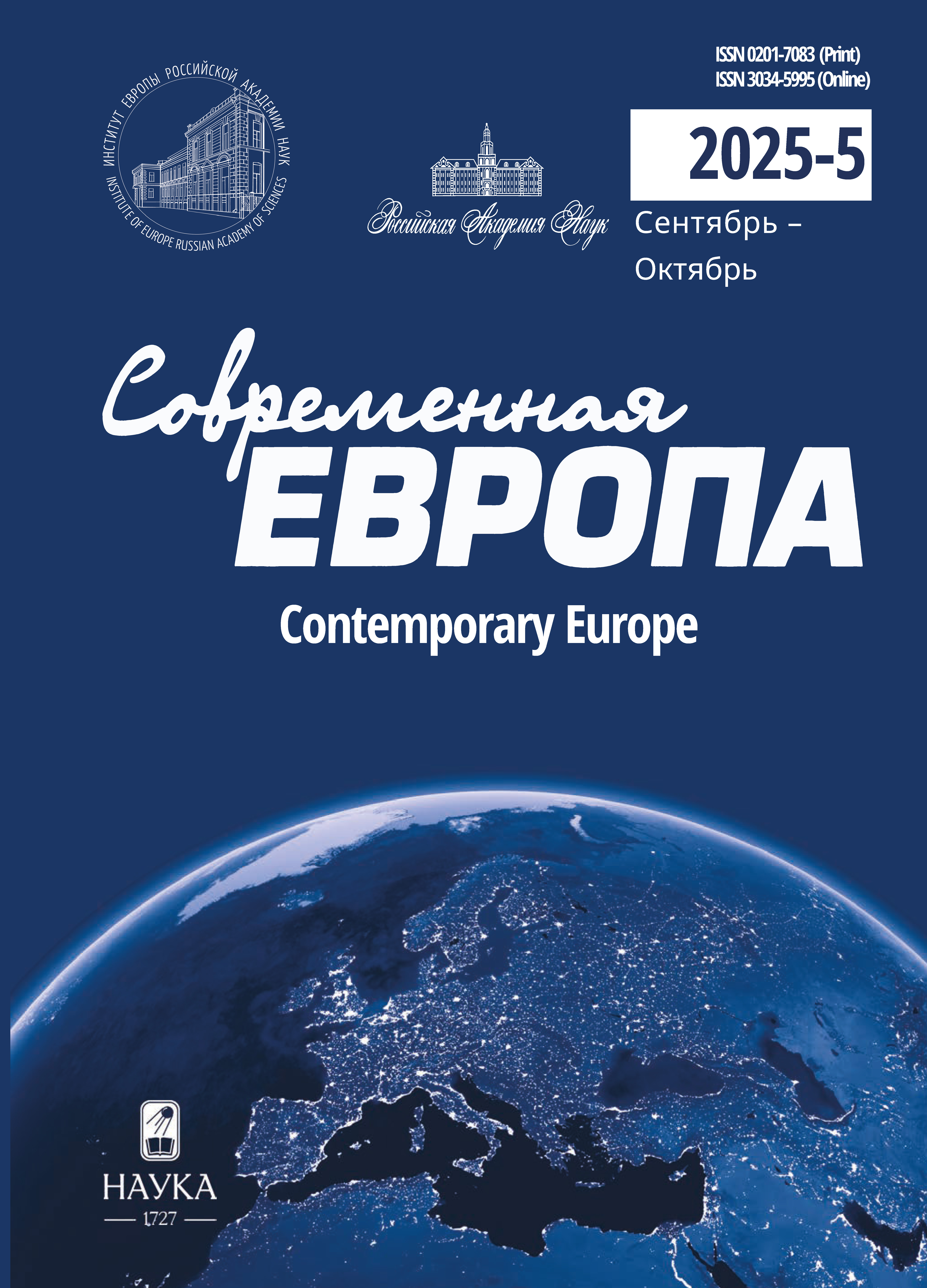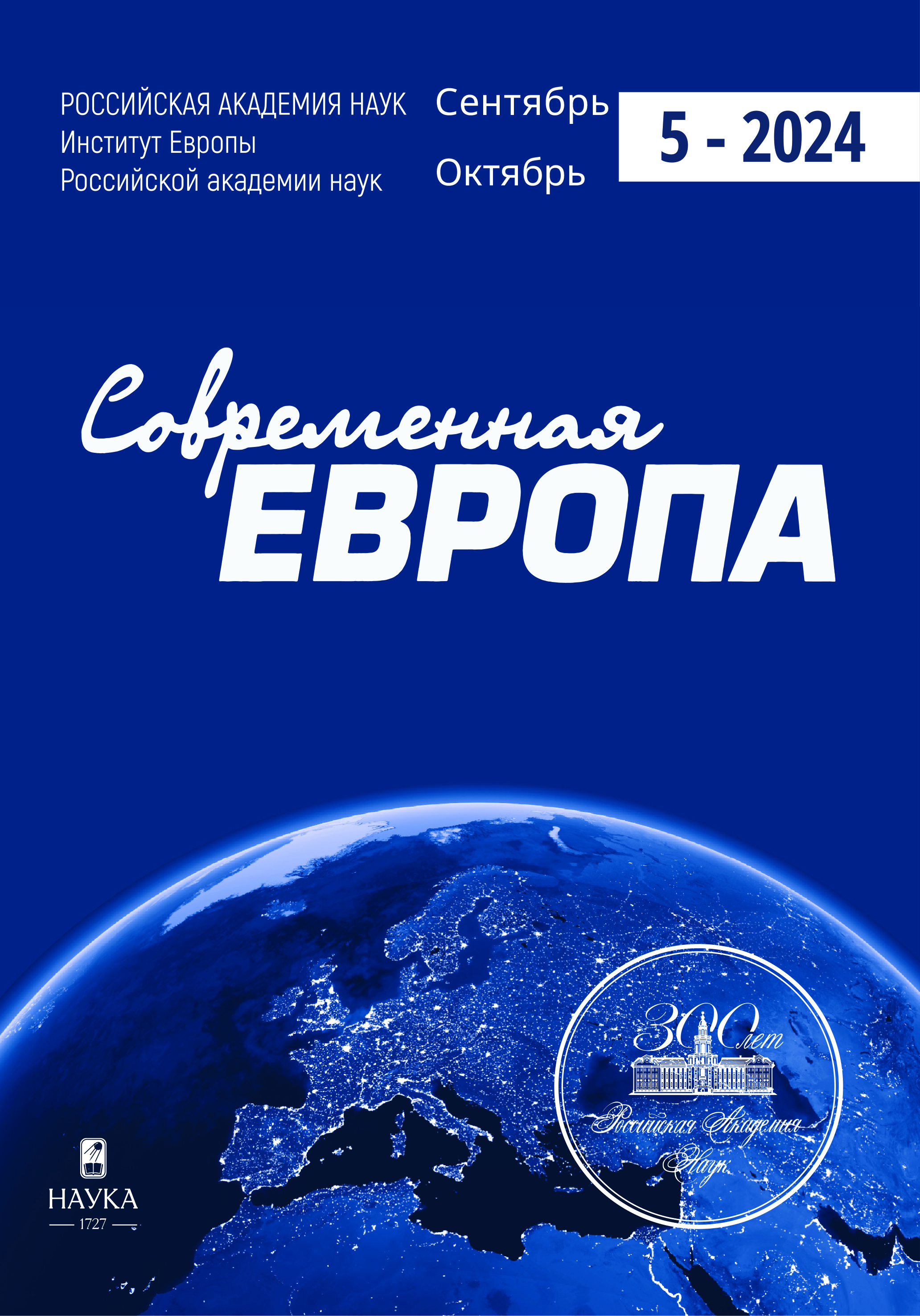№ 5 (126) (2024)
Статьи
ЯДЕРНОЕ СДЕРЖИВАНИЕ И РАЗОРУЖЕНИЕ В ПОЛИЦЕНТРИЧНОМ МИРЕ
Аннотация
 5-20
5-20


ЕВРОПЕЙСКИЙ ПРОЦЕСС: СТРАНЫ И РЕГИОНЫ
СТАНОВЛЕНИЕ ГЕРМАНИИ КАК МЕЖДУНАРОДНОГО КОСМИЧЕСКОГО ШТАНДОРТА
Аннотация
 21-35
21-35


ПОИСК НОВОЙ СТРАТЕГИИ ФРАНКО-ГЕРМАНСКОГО ТАНДЕМА: ПЕРИОД ОГРАНИЧЕННОЙ ДЕЕСПОСОБНОСТИ
Аннотация
 36-48
36-48


ПОДХОД К КИТАЮ В СТРАТЕГИЧЕСКОМ ВИДЕНИИ ЕС (2016–2023 ГГ.)
Аннотация
 49-59
49-59


THE TRANSFORMATION OF CHINA’S IMAGE IN EUROPEAN EXPERT DISCOURSE
Аннотация
The article examines how the European expert community perceives China and how this perception has changed from 2003 to 2023, using the classic image theory approach of Richard Herrmann and Michel Fischerkeller. The main objective of this study is to trace how the transformations in the image of China were affected by the evolution of Sino-European relations and to what extent these transformations influenced EU policy toward China. Given the significant role that the epistemic community plays in shaping policy in Europe, both at the national and EU levels, the focus is made on expert positions. The study applies qualitative content analysis of policy papers from seven of the most reputed European think tanks, covering the period of 2003–2023 (a total of 187 documents). Relying on the five ideal-typical images of the “Other” (enemy, ally, degenerate, empire and colony), the paper contributes to the theoretical framework by introducing a new ideal-typical image – a rival – to better describe the nature of EU-China relations and European experts’ perception of China. The conclusion is made that the image of China has shifted from that of an ally with degenerate elements to that of a rival with significant enemy elements. Key periods and turning points in the evolution of China’s image are identified and the linkage between this image and the official EU policy toward China is revealed.
 60-73
60-73


«АРХИТЕКТОРЫ ФРАНСАФРИК»? ЭКСПЕРТНО-АНАЛИТИЧЕСКОЕ ОБЕСПЕЧЕНИЕ СОВРЕМЕННОЙ ПОЛИТИКИ ФРАНЦИИ В АФРИКЕ
Аннотация
 74-87
74-87


ФРАНКО-МОЛДАВСКИЕ ОТНОШЕНИЯ НА СОВРЕМЕННОМ ЭТАПЕ
Аннотация
 88-97
88-97


ПАРЛАМЕНТСКИЕ ВЫБОРЫ В БРИТАНИИ 2024 Г. НЕТРИУМФАЛЬНЫЙ ТРИУМФ ЛЕЙБОРИСТОВ
Аннотация
 98-111
98-111


ВЛИЯНИЕ БРИТАНИИ НА ПОСТСОВЕТСКОМ ПРОСТРАНСТВЕ: КУЛЬТУРНО-ГУМАНИТАРНЫЙ АСПЕКТ
Аннотация
 112-125
112-125


БЛИЖНЕВОСТОЧНАЯ «ЭКСПАНСИЯ» НА БАЛКАНЫ
Аннотация
 126-136
126-136


ПРОБЛЕМЫ ЭКОНОМИКИ
ГЕОПОЛИТИЧЕСКАЯ ИНИЦИАТИВА КОМИССИИ ЕС «ГЛОБАЛЬНЫЕ ВРАТА»
Аннотация
 137-149
137-149


ГЕОЭКОНОМИЧЕСКИЙ ПОВОРОТ: ПРИОРИТЕТЫ ПОЛИТИКИ НОВОЙ ЕВРОКОМИССИИ
Аннотация
 150-161
150-161


ТЕНДЕНЦИИ И ПЕРСПЕКТИВЫ РАЗВИТИЯ ОСОБОЙ ЭКОНОМИЧЕСКОЙ ЗОНЫ В КАЛИНИНГРАДСКОЙ ОБЛАСТИ
Аннотация
 162-175
162-175


СОЦИАЛЬНАЯ СФЕРА
EFFICIENCY AND PRODUCTIVITY EVALUATION OF HEALTHCARE SYSTEMS OF NORTHERN EUROPE AND THE BALTIC REGION
Аннотация
 176-188
176-188


ПРОБЛЕМЫ ИДЕНТИЧНОСТИ
СОТРУДНИЧЕСТВО ЕС И НАТО ПОСЛЕ НАЧАЛА СПЕЦИАЛЬНОЙ ВОЕННОЙ ОПЕРАЦИИ РОССИИ
Аннотация
 189-200
189-200


ИДЕНТИСТЫ ПРОТИВ АНТИИДЕНТИСТОВ: ПРОЛОГ К УКРАИНСКОМУ КРИЗИСУ
Аннотация
 201-216
201-216


ЕВРОПЕЙСКАЯ КУЛЬТУРА
О РОЛИ МАЛЫХ ИСТОРИЧЕСКИХ ГОРОДОВ В СОХРАНЕНИИ НАЦИОНАЛЬНОЙ ИДЕНТИЧНОСТИ (на примере Стратфорда-на-Эйвоне)
Аннотация
 217-227
217-227













